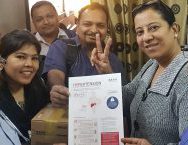Cardiovascular Diseases

The Silent Killer
Cardiovascular diseases (CVDs), a group of heart and blood vessel disorders, are the number one cause of death and disability globally. Hypertension, or high blood pressure, is a leading risk factor for CVD and causes over 10 million deaths worldwide each year. Hypertension treatment is simple, effective, and affordable, yet the condition is often overlooked because it typically does not produce symptoms. Left untreated, this “silent killer” can lead to heart disease, stroke, and kidney failure.
In low- and middle-income countries (LMICs), many deaths due to hypertension are premature, occurring in people under the age of 70. People are often not aware that they have high blood pressure because it is not routinely measured. If diagnosed, they may not have reliable access to the healthcare services or the treatment they need to control their blood pressure and reduce their risk of death and disability.
Reducing Premature Deaths
To improve prevention and control of CVDs globally, CDC, WHO, and other partners launched the Global Hearts Initiative, which includes the HEARTS technical package. CDC helped develop and supports implementation of the HEARTS technical package which promotes the use of evidence-based tools and practices to improve hypertension control through primary health care.
Improving Measurement
As countries implement strategies to tackle CVD and its risk factors, they need reliable methods to track the effectiveness of their programs. CDC works with partners to develop surveillance tools and protocols to produce data on blood pressure, sodium, and trans-fatty acids.
Expanding the Evidence Base
There is a shortage of published CVD research led by authors from LMICs. Increasing the number of peer-reviewed, published articles from local health researchers is critical to understanding the local burden of NCDs, informing public health planning and developing timely and effective interventions. CDC and partners support expanding the evidence base through the CVD Small Grants program and the Emerging Authors Program.
The CVD Small Grants Program provides modest funding to a select group of global field epidemiologists, also known as “disease detectives,” in collaboration with the Training Programs in Epidemiology and Public Health Interventions Network (TEPHINET) and other partners. This competitive program supports current residents and recent graduates of the Field Epidemiology Training Program (FETP) in leading projects that strengthen health systems by addressing NCD/CVD health needs. Grantees receive mentorship from local and global experts.
The Emerging Authors Program (EAP) provides training and mentorship on scientific writing and publication. So far, EAP participants have published two special supplements in the Journal of Clinical Hypertension.
